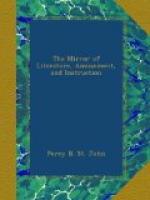Love.
What does Sterne say? That love is no more made by talking of it, than a black pudding would be. Habit, association, assimilation of tastes, communion of thought, kindness without pretension, solicitude without effort, a tacit agreement and a silent sympathy; these are the excitements and stimulants of the only sort of love that is worth thinking of.
Brighton.
Brighton will be as good a residence as any other; there’s nobody there knows much of either of you; and the place has got so big, that you may be as snug as you please; a large town and a large party, are the best possible shelters for love matters. Ay, go to Brighton—the prawns for breakfast, the Wheatears (as the Cockneys delicately call them, without knowing what they are talking about) for dinner, and the lobsters for supper, with a cigar, and a little ginnums and water, whiffing the wind, and sniffing the briny out of one of the bow-window balconies—that’s it—Brighton’s the place, against the world.
Murder.
A gentleman criminal is too rich a treat to be overlooked; and a murder in good society forms a tale of middling life, much too interesting to be passed over in a hurry.
A Love Errand.
He went to look for something which he had not left there, and whither she followed him, to assist in a pursuit which she knew went for nothing.
* * * * *
MOORE’S LIFE OF BYRON, VOL. II.
The publication of this work, bona fide, has not yet taken place; but we are enabled by the aid of the Athenaeum to quote a page.
The volume commences with the following powerful review of Lord Byron’s mind and fortune at the time he left England:—
“The circumstances under which Lord Byron now took leave of England were such as, in the case of any ordinary person, could not be considered otherwise than disastrous and humiliating. He had, in the course of one short year, gone through every variety of domestic misery;—had seen his hearth ten times profaned by the visitations of the law, and been only saved from a prison by the privileges of his rank. He had alienated (if, indeed, they had ever been his) the affections of his wife; and now, rejected by her, and condemned by the world, was betaking himself to an exile which had not even the dignity of appearing voluntary, as the excommunicating voice of society seemed to leave him no other resource. Had he been of that class of unfeeling and self-satisfied natures from whose hard surface the reproaches of others fall pointless, he might have found in insensibility a sure refuge against reproach; but, on the contrary, the same sensitiveness that kept him so awake to the applauses of mankind rendered him, in a still more intense degree, alive to their censure. Even the strange, perverse pleasures which he




